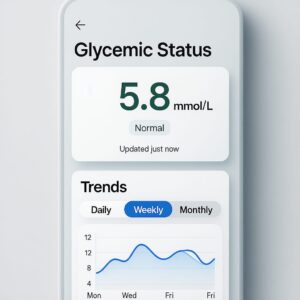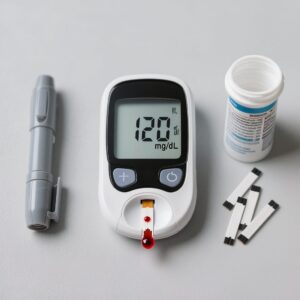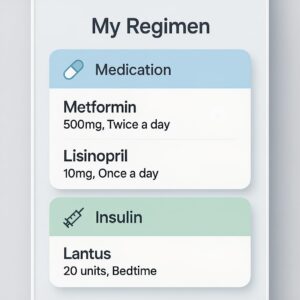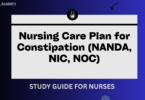Diabetes Nursing Care Plan (NANDA): Diagnoses, Interventions, Goals
Diabetes requires vigilant, coordinated nursing care to keep blood glucose stable, prevent complications, and support sustainable self-management. A structured care plan anchored in NANDA-I diagnoses, clear assessments, targeted interventions with rationales, and measurable outcomes helps teams act decisively in inpatient and community settings. The following comprehensive guide organizes priority nursing actions for both type 1 and type 2 diabetes, with practical details that fit busy clinical workflows.
Diabetes Overview in Nursing Practice
- Diabetes mellitus is a chronic metabolic disorder characterized by hyperglycemia due to impaired insulin secretion, insulin resistance, or both. Core categories include:
- Type 1 diabetes (autoimmune beta-cell destruction, absolute insulin deficiency)
- Type 2 diabetes (progressive insulin secretory defect on the background of insulin resistance)
- Gestational diabetes (glucose intolerance first recognized during pregnancy)
- Secondary diabetes (e.g., pancreatitis, steroid-induced, Cushing syndrome)
Key clinical concepts for care planning:
- Glycemic targets often align with established standards (e.g., fasting/pre-meal 80–130 mg/dL, postprandial <180 mg/dL in many adults), individualized by comorbidity, age, risk of hypoglycemia, and clinical setting.
- Hospital targets are frequently more conservative to avoid hypoglycemia; protocols guide insulin use, dextrose administration, and monitoring frequency.
- Complication spectrum: acute (hypoglycemia, diabetic ketoacidosis [DKA], hyperosmolar hyperglycemic state [HHS]) and chronic (neuropathy, nephropathy, retinopathy, cardiovascular disease, peripheral arterial disease, diabetic foot ulcers).
Priority Nursing Assessment for Diabetes
A thorough initial and ongoing assessment drives safe, evidence-based decisions.
Glycemic Status and Trends
- Capillary blood glucose (CBG) schedule and trends; CGM metrics if available (time-in-range, time-below-range).
- Symptoms of hypo/hyperglycemia: tremor, confusion, diaphoresis, palpitations, polyuria, polydipsia, fatigue, blurred vision.
- Most recent HbA1c and correlation with daily readings.
- Laboratory markers as ordered: BMP/CMP, ketones, serum osmolality, anion gap, beta-hydroxybutyrate.
Medication and Insulin Regimens
- Insulin type(s): rapid-, short-, intermediate-, and long-acting; concentration (U-100 vs U-200, U-300, U-500).
- Delivery methods: pens, syringes, pump therapy; infusion set changes and site inspection.
- Non-insulin agents: metformin, GLP-1 RA, SGLT2 inhibitors, DPP-4 inhibitors, thiazolidinediones, sulfonylureas effects, side effects, and contraindications.
Nutrition and Meal Patterns
- Meal timing, carbohydrate distribution, and matching with insulin peaks.
- Appetite changes, nausea, vomiting, or gastroparesis signs (early satiety, bloating).
- Hydration status and use of sugar-sweetened beverages or alcohol.
Acute Complication Risk
- Hypoglycemia risk factors: recent insulin titration, renal or hepatic impairment, reduced oral intake, delayed meals, alcohol.
- DKA/HHS risk factors: infection, missed insulin, pump failure, dehydration, new-onset diabetes.
Chronic Complication Screening
- Peripheral neuropathy: paresthesias, pain, loss of protective sensation.
- Foot exam: inspection, pulses, temperature, deformities, calluses, ulceration.
- Skin integrity: intertrigo, fungal infections, wound healing.
- Vision and renal status: retinopathy history, microalbuminuria/eGFR trends.
- Cardiovascular: blood pressure, lipid management, smoking status.
Psychosocial, Education, and Access
- Health literacy, numeracy, and language preferences.
- Distress, depression, or anxiety screening.
- Access to supplies (strips, lancets, insulin, sharps container), refrigeration, transportation, safe housing.
- Cultural or religious practices affecting meals or medication timing.
NANDA-I Nursing Diagnoses for Diabetes: Goals, Interventions, and Rationales
1) Risk for Unstable Blood Glucose Level related to variable insulin needs, inconsistent intake, illness, or medication effects
Outcomes/Goals (SMART):
- Maintain glucose within individualized targets during hospitalization/episode of care.
- Zero episodes of severe hypoglycemia or hyperglycemia requiring rescue therapy within care period.
- Demonstrate stable pre-meal and bedtime readings within agreed range for 48–72 hours.
Interventions with Rationales:
- Implement glucose monitoring per protocol (e.g., AC/HS or every 4-6 hours; CGM if available) for frequent data guides timely insulin and nutrition adjustments.
- Coordinate insulin with meals, tube feeds, or TPN timing; avoid “insulin without intake.” to synchronize insulin and carbohydrates prevents hypoglycemia.
- Use basal bolus correction protocols rather than sliding scale alone and help physiologic coverage reduces glycemic variability.
- Review concurrent drugs (steroids, beta-blockers, fluoroquinolones) for several agents alter glucose balance or mask hypoglycemia.
- Promote consistent carbohydrate meal planning; consult dietitian for predictable intake supports stable dosing.
- Establish hypoglycemia protocol (15 g fast-acting carbohydrate, recheck at 15 minutes; IV dextrose/glucagon as ordered) for standardized response shortens time-below-range.
- For illness or perioperative periods, follow sick-day or perioperative insulin guidance and stress and decreased intake require proactive adjustments.
- Assess for infusion set or pump alarms; ensure backup rapid-acting insulin availability for pump interruptions raise DKA risk.
Evaluation:
- Glucose logs within target range; reduced need for rescue corrections.
- No severe hypo/hyperglycemic events.
2) Ineffective Health Management related to complex regimen, limited resources, low health literacy, or competing priorities
Defining characteristics:
- Missed doses, inconsistent SMBG/CGM scanning, difficulty timing meals and insulin, limited understanding of sick-day rules.
Outcomes/Goals:
- Demonstrate correct technique for glucose monitoring, insulin administration, and sharps disposal before discharge.
- Establish a practical, written self-management plan aligned with resources and schedule.
- Attend scheduled follow-ups with necessary supplies.
Interventions with Rationales:
- Provide stepwise education using teach-back and visual checklists; verify understanding of core tasks (monitoring, insulin, hypoglycemia treatment) for structured education improves retention and safety.
- Simplify regimens when possible (fixed-dose meals, once-daily basal) in coordination with prescribers for simplicity improves adherence.
- Arrange diabetes education referral (CDCES), dietitian consult, and pharmacist review for interdisciplinary support strengthens self-management.
- Address barriers: transportation, cost, refrigeration, and safe storage and logistics determine real-world feasibility.
- Offer culturally sensitive meal planning and fasting accommodations and respects preferences while maintaining safety.
Evaluation:
- Documented successful teach-back; fewer missed doses; consistent monitoring records.
3) Risk for Infection related to hyperglycemia, impaired circulation, and skin barrier compromise
Outcomes/Goals:
- No signs of infection during care period; wounds remain clean with progress toward healing.
- A1c and daily glucose trends move toward targets to support immune function.
Interventions with Rationales:
- Maintain glycemic control within targets for hyperglycemia impairs neutrophil function and wound healing.
- Oral care and perineal hygiene protocols; prompt management of candidal infections and reduces common infection sources.
- Aseptic technique for injections, catheter care, and dressing changes; rotate injection sites which help prevents localized infection and lipohypertrophy.
- Foot protection and daily inspection, moisture control, and properly fitted footwear helps reduces ulcer formation and infection risk.
- Vaccination review per guidelines (influenza, pneumococcal, hepatitis B when indicated)and prevents vaccine-preventable infections.
Evaluation:
- Afebrile status; normal WBC trend; clean wounds; no new infection diagnoses.
4) Impaired Skin Integrity (Diabetic Foot) related to neuropathy, ischemia, or pressure
Defining characteristics:
- Calluses, fissures, deformities (hammer toes, Charcot changes), ulceration, delayed healing.
Outcomes/Goals:
- Skin remains intact; existing wounds reduce in size by X% within Y weeks per wound care plan.
- Protective sensation and footwear evaluation completed.
Interventions with Rationales:
- Perform comprehensive foot exam: monofilament testing, vibration (128 Hz), pulses, temperature gradient and early detection of neuropathy and ischemia.
- Offload pressure using appropriate devices (total contact cast, removable walker, specialized footwear) and offloading drives ulcer healing.
- Moist wound healing with appropriate dressings; consult wound care and supports granulation and re-epithelialization.
- Glycemic control optimization and smoking cessation support for microvascular perfusion and leukocyte function improve with control.
- Podiatry referral for nail and callus care; avoid bathroom surgery for professional care prevents iatrogenic wounds.
Evaluation:
- Improvement in wound measurements; intact surrounding skin; no infection.
5) Risk for Injury (Hypoglycemia) related to insulin or sulfonylurea use, renal impairment, or erratic intake
Outcomes/Goals:
- Zero level 2–3 hypoglycemia episodes (≤54 mg/dL or severe) during care period.
- Recognize early signs and initiate prompt treatment per protocol.
Interventions with Rationales:
- Standardized hypoglycemia algorithm at bedside; dextrose or glucagon available for rapid treatment prevents progression.
- Match insulin dosing to carbohydrate intake, activity, and renal function for dose alignment prevents overcorrection.
- Time monitoring at insulin peak actions; add bedtime check when indicated for peaks correlate with risk.
- Evaluate nocturnal risk; consider CGM with alerts when feasible and alarms reduce unrecognized episodes.
- Educate support persons on recognition and rescue steps and timely assistance reduces harm.
Evaluation:
- Protocol adherence; hypoglycemia rate at or near zero; minimal time-below-range in CGM reports.
6) Deficient Knowledge (Disease Process and Treatment) related to unfamiliarity with diabetes care requirements
Outcomes/Goals:
- Explain diabetes type, medication purpose, hypoglycemia/hyperglycemia signs, and sick-day actions in plain language.
- Demonstrate correct insulin pen/syringe technique and site rotation.
Interventions with Rationales:
- Provide brief, focused education sessions; reinforce with teach-back and printed guides and spaced learning improves mastery.
- Use multimodal tools: demonstrations, models, videos, and language-appropriate materials and varied methods address different learning styles.
- Clarify storage requirements for insulin and expiration timelines and potency depends on proper handling.
- Review sick-day plan: more frequent monitoring, ketone checks for type 1, fluids, and timely medical contact if unable to maintain intake or if vomiting persists help prevents DKA and HHS.
Evaluation:
- Accurate explanations and demonstrations recorded; reduced unplanned visits for preventable issues.
7) Imbalanced Nutrition: Less Than Body Requirements related to nausea, early satiety, gastroparesis, or catabolic state
Outcomes/Goals:
- Meet energy and protein targets; achieve gradual weight restoration as indicated.
- Reduce meal duration and early satiety symptoms.
Interventions with Rationales:
- Small, frequent meals with individualized carbohydrate goals; consider liquid nutrition when mastication is limited help tolerable intake enhances nutrition.
- Gastroparesis management: low-fat, low-fiber meals; prokinetics as prescribed; adjust insulin timing (post-meal dosing in select cases) and synchronizes insulin with delayed absorption.
- Anti-emetics and hydration support to help reduce losses and improves intake.
- Monitor weight, prealbumin (if ordered), and symptom logs and tracks response and guides adjustments.
Evaluation:
- Stabilized weight; improved tolerance of meals; better glycemic predictability.
8) Imbalanced Nutrition: More Than Body Requirements related to excessive intake and reduced activity
Outcomes/Goals:
- Achieve gradual weight reduction consistent with health goals while maintaining glycemic stability.
- Improve dietary quality and activity level.
Interventions with Rationales:
- Nutrition counseling emphasizing non-starchy vegetables, lean proteins, whole grains, and portion awareness and nutrient-dense patterns aid weight and glucose control.
- Encourage regular physical activity as medically appropriate; arrange PT consult for limitations and activity improves insulin sensitivity and cardiovascular health.
- Consider agents with weight benefit (e.g., GLP-1 RA, SGLT2 inhibitors) per prescriber judgment and pharmacotherapy can assist weight and glycemia.
Evaluation:
- Weight and waist circumference trending toward targets; improved time-in-range.
9) Deficient Fluid Volume related to osmotic diuresis (DKA/HHS)
Defining characteristics:
- Polyuria, polydipsia, tachycardia, hypotension, dry mucous membranes; in DKA: ketonemia, acidosis; in HHS: marked hyperosmolality.
Outcomes/Goals:
- Restore hemodynamic stability; normalize electrolytes, osmolality, and acid-base balance.
- Resolve ketosis and close anion gap in DKA; improve mental status in HHS.
Interventions with Rationales:
- Initiate fluid resuscitation per protocol (e.g., isotonic saline); monitor input/output and hemodynamics and corrects hypovolemia and improves perfusion.
- Insulin infusion per protocol with hourly glucose and electrolyte monitoring and gradually lowers glucose/osmolality and suppresses ketogenesis.
- Potassium management based on labs; replace as indicated and insulin shifts K+ intracellularly, risking hypokalemia.
- Identify precipitating factors (infection, pump failure, missed insulin) help prevents recurrence.
Evaluation:
- Vital signs stabilized; anion gap closed; mental status improved; safe transition to subcutaneous insulin.
10) Activity Intolerance related to fatigue, deconditioning, or hypo/hyperglycemia
Outcomes/Goals:
- Tolerate progressive activity without hypo/hyperglycemic events.
- Report improved endurance and daily function.
Interventions with Rationales:
- Assess pre-activity glucose; schedule activity to avoid insulin peak if appropriate which reduces hypoglycemia risk.
- Gradual activity progression with rest intervals; PT involvement for individualized plan for safe conditioning improves capacity.
- Hydration support and glucose sources readily available helps maintains perfusion and prevents symptomatic lows.
Evaluation:
- Increased activity duration and intensity without adverse events.
11) Disturbed Sensory Perception (Tactile) related to peripheral neuropathy
Outcomes/Goals:
- Protect feet from injury; maintain intact skin without new lesions.
- Reduce neuropathic pain to acceptable levels.
Interventions with Rationales:
- Daily foot checks; moisture control between toes; avoidance of walking barefoot and loss of protective sensation raises injury risk.
- Footwear assessment and orthotics for deformities; podiatry follow-up and proper fit reduces pressure points.
- Neuropathic pain management per provider (duloxetine, pregabalin, gabapentin); non-pharmacologic options (TENS if ordered) and multimodal relief improves function.
Evaluation:
- No new ulcers; pain scores improved.
Insulin Therapy Essentials for Nursing Care
Insulin Types and Timing
- Rapid-acting analogs (e.g., lispro, aspart, glulisine): onset ~10–20 min; peak ~1–3 h; duration 3–5 h.
- Short-acting (regular): onset 30–60 min; peak 2–4 h; duration 5–8 h.
- Intermediate (NPH): onset 1–2 h; peak 4–12 h; duration 12–18 h.
- Long-acting (glargine, detemir) and ultra-long (degludec): minimal peak; duration 18–42 h.
Key safety points:
- Match bolus insulin to carbohydrate intake and correction factors per orders.
- Rotate injection sites (abdomen, thigh, arm, buttocks) to prevent lipohypertrophy.
- Verify insulin concentration and device; double-check high-alert medications.
- Store unopened insulin refrigerated; check manufacturer guidance for room-temperature stability after opening.
Patient Education and Discharge Planning
Core topics for safe transition:
- SMBG/CGM: device operation, frequency, hand hygiene, sensor placement, alarm response, and documentation of readings and symptoms.
- Hypoglycemia protocol: signs, 15 g fast-acting carbohydrate, recheck in 15 minutes, repeat if needed; escalate to IV dextrose or glucagon per orders when oral intake is unsafe.
- Sick-day rules: more frequent monitoring; type 1 patients check ketones with sustained hyperglycemia or illness; maintain hydration; seek timely medical help for persistent vomiting or rising ketones.
- Nutrition basics: consistent carbohydrate pattern, adequate fiber and protein, meal timing aligned with insulin.
- Foot care: daily inspection, drying between toes, emollients for dry skin (not between toes), nail care by trained providers, protective footwear.
- Medication management: dosing schedules, common side effects, interactions (e.g., SGLT2 and euglycemic DKA risk during illness or perioperative periods).
- Equipment and supplies: pen needles/syringes, lancets, strips, CGM supplies, sharps container; refill and replacement schedule.
- Follow-up: endocrinology or primary care, diabetes education, dietitian, podiatry, ophthalmology, and lab monitoring (HbA1c, lipids, renal function).
Special Populations and Settings
Older Adults
- Individualize glycemic targets considering comorbidities, cognitive status, and fall risk.
- Minimize hypoglycemia; favor regimens with lower risk.
- Assess for polypharmacy and renal dosing adjustments.
Pediatrics and Adolescents
- Support growth and development; coordinate care with school nurses.
- Address psychosocial dynamics, peer influence, and transition to independent management.
- Emphasize sick-day and ketone monitoring for type 1 diabetes.
Pregnancy and Gestational Diabetes
- Tight glycemic targets guided by obstetric and diabetes specialists.
- Nutrition and insulin adaptations as pregnancy progresses.
- Monitor for preeclampsia, fetal growth abnormalities, and postpartum reassessment.
Inpatient vs. Outpatient Nuances
- Inpatient: standardized insulin protocols, hypoglycemia order sets, NPO adjustments, and perioperative management.
- Outpatient: long-term complication screening, lifestyle support, vaccination updates, and self-management reinforcement.
Interdisciplinary Collaboration
- Endocrinology: complex regimen titration, technology (pump/CGM) optimization.
- Certified Diabetes Care and Education Specialist (CDCES): structured education and behavior change strategies.
- Dietitian: individualized meal planning, carb counting, and weight management.
- Pharmacy: medication reconciliation, affordability strategies, device training.
- Podiatry: foot risk stratification, debridement, footwear.
- Ophthalmology: annual dilated eye exams or as indicated.
- Social Work/Case Management: resource navigation, insurance, transportation, housing stability.
Documentation and Evaluation
- Baseline: diabetes type, duration, HbA1c, complications, current medications, technology use, allergies.
- Diagnoses: list NANDA-I diagnoses with related factors and defining characteristics.
- SMART goals: specify target ranges, timelines, and responsible disciplines.
- Interventions: frequency, technique, safety checks, and patient education content.
- Evaluation: response to therapy, glycemic trends, adverse events (hypoglycemia), wound progress, adherence indicators.
- Disposition: follow-up appointments, referrals, supply list, and contingency plans.
Sample Diabetes Nursing Care Plan Template
Use the following structure to standardize documentation.
1. Problem/Diagnosis: Risk for Unstable Blood Glucose Level
Assessment Cues: variable readings, recent steroid initiation, missed insulin doses.
Goal: Maintain glucose 80–180 mg/dL during admission with zero severe hypoglycemia.
Interventions:
- Monitor CBG AC/HS; initiate hypoglycemia protocol for readings <70 mg/dL.
- Implement basal–bolus–correction regimen per protocol; hold rapid-acting insulin if NPO without dextrose.
- Coordinate meal timing with insulin; consult dietitian for consistent carbohydrate plan.
Evaluation: Targets maintained for 72 hours; no rescue dextrose/glucagon required.
2. Problem/Diagnosis: Impaired Skin Integrity (Diabetic Foot)
Assessment Cues: calluses, peripheral neuropathy, foot deformity.
Goal: Prevent new ulcers; reduce existing wound size by 30% in 4 weeks.
Interventions:
- Daily foot inspection and moisture control; pressure offloading device when indicated.
- Glycemic optimization; smoking cessation support.
- Podiatry and wound care referrals; evidence-based dressing regimen.
Evaluation: No new lesions; wound measurements improving.
3. Problem/Diagnosis: Deficient Knowledge
Assessment Cues: uncertainty about insulin timing, storage, and hypoglycemia treatment.
Goal: Demonstrate correct pen technique and hypoglycemia steps prior to discharge.
Interventions:
- Teach-back modules for SMBG/CGM, insulin administration, site rotation, sharps disposal.
- Provide language-appropriate handouts and contact information for follow-up.
Evaluation: Accurate return demonstration; completed education checklist.
Quality and Safety Pearls
- Avoid insulin stacking: consider active insulin before correction dosing.
- Prevent medication errors: tall-man lettering, double-checks, barcode scanning for insulin.
- Steroid-induced hyperglycemia: preemptive basal and mealtime insulin adjustments; closer monitoring.
- SGLT2 inhibitor considerations: hold during acute illness or perioperative periods to reduce euglycemic DKA risk when appropriate.
- Foot safety: thermal water testing with elbow or thermometer for those with sensory loss; never rely on plantar sensation to judge water temperature.

Glycemic Status and Trends
Measuring Outcomes That Matter
- Clinical: time-in-range improvement, reduced hypoglycemia, wound healing rates, blood pressure and lipid control.
- Utilization: fewer ED visits for hypo/hyperglycemia, reduced readmissions for DKA/HHS.
- Experience: improved confidence with monitoring and insulin tasks; satisfaction with education and support.
- Equity: improved access to supplies and education for under-resourced populations.
Frequently Used Tools and References (educational)
- NANDA-I Nursing Diagnoses (latest edition) for standardized terminology.
- ADA Standards of Care for glycemic targets, technology, and pharmacotherapy.
- Validated risk tools: Hypoglycemia risk scores, MAUQ for mHealth usability, diabetic foot risk stratification.
- Pain scales for neuropathy (e.g., DN4), monofilament and tuning fork for sensation testing.
H2: Frequently Asked Questions (FAQ)
Q1: What are priority nursing diagnoses for diabetes?
A: Common priorities include Risk for Unstable Blood Glucose Level, Ineffective Health Management, Risk for Infection, Impaired Skin Integrity (diabetic foot), Imbalanced Nutrition (more or less than body requirements), Risk for Injury (hypoglycemia), Deficient Knowledge, and Deficient Fluid Volume in DKA/HHS contexts.
Q2: What nursing interventions help prevent hypoglycemia?
A: Align insulin with carbohydrate intake and activity, use basal–bolus–correction protocols, schedule monitoring at insulin peaks, maintain fast-acting carbohydrate at bedside as permitted, and keep dextrose or glucagon available per orders. Review renal function and adjust doses to reduce risk.
Q3: What are realistic goals/outcomes in a diabetes care plan?
A: Goals often target safe glycemic ranges, zero severe hypoglycemia, intact skin and foot health, progressive wound healing, improved self-management skills, attendance at follow-ups, and reduction in ED visits for preventable complications. Timelines are individualized and measurable.
Q4: How do inpatient and outpatient diabetes care plans differ?
A: Inpatient plans emphasize standardized insulin protocols, NPO and perioperative adjustments, and frequent monitoring. Outpatient plans focus on long-term complication screening, lifestyle support, technology optimization, vaccination updates, and sustained self-management education.
Q5: When should DKA or HHS be suspected?
A: Suspect DKA with hyperglycemia plus ketonemia/ketonuria, abdominal pain, Kussmaul respirations, or anion-gap acidosis. Suspect HHS with profound hyperglycemia, hyperosmolality, altered mentation, and minimal ketones. Both require urgent fluid resuscitation and insulin protocols.
Conclusion
A high-quality diabetes nursing care plan ties together precise assessments, NANDA-I diagnoses, SMART goals, and practical interventions with clear rationales. Interdisciplinary teamwork, consistent education, and mindful protocol use reduce acute events, protect skin integrity, and improve long-term outcomes. With thoughtful documentation and continuous evaluation, nursing teams deliver safer glucose management and meaningful support across all care settings.









